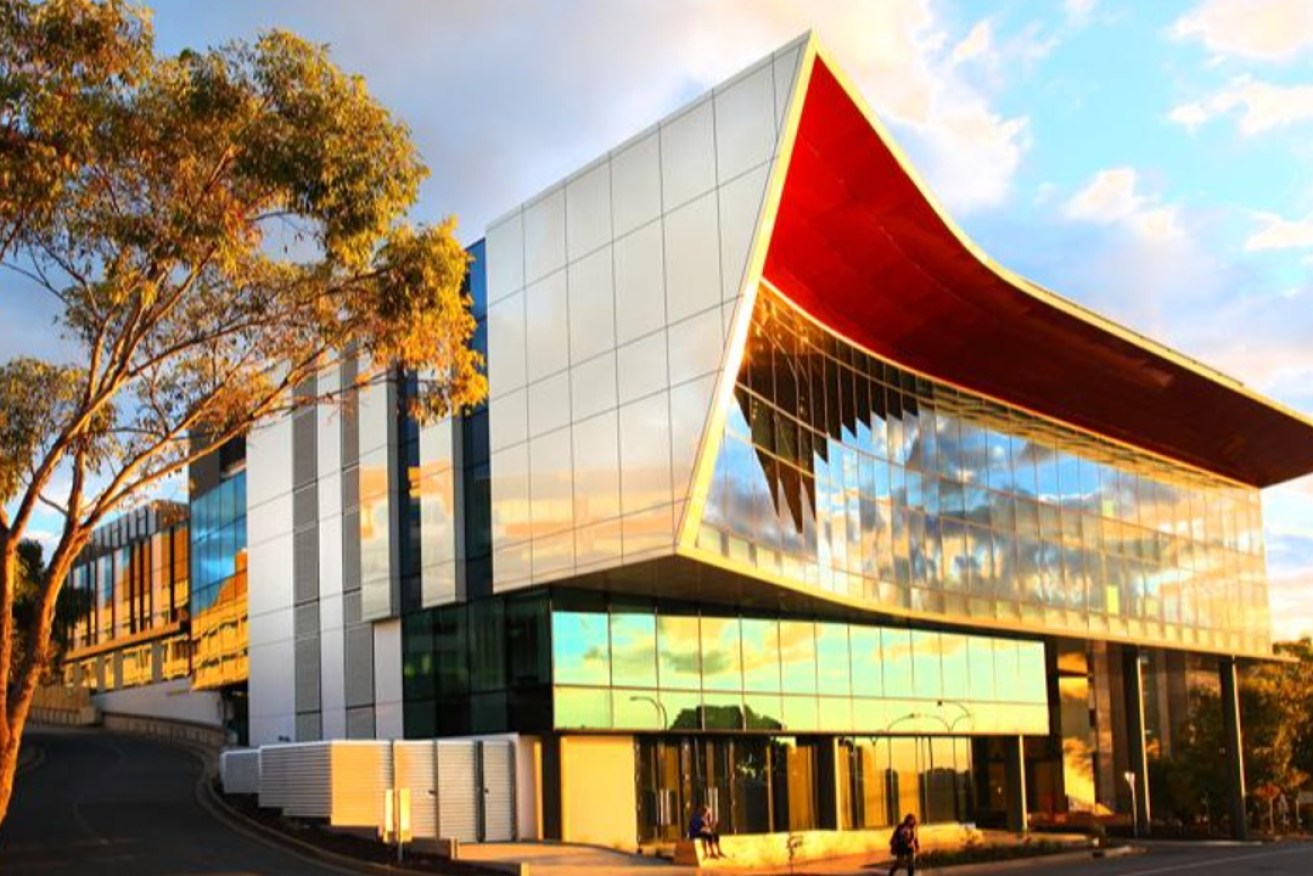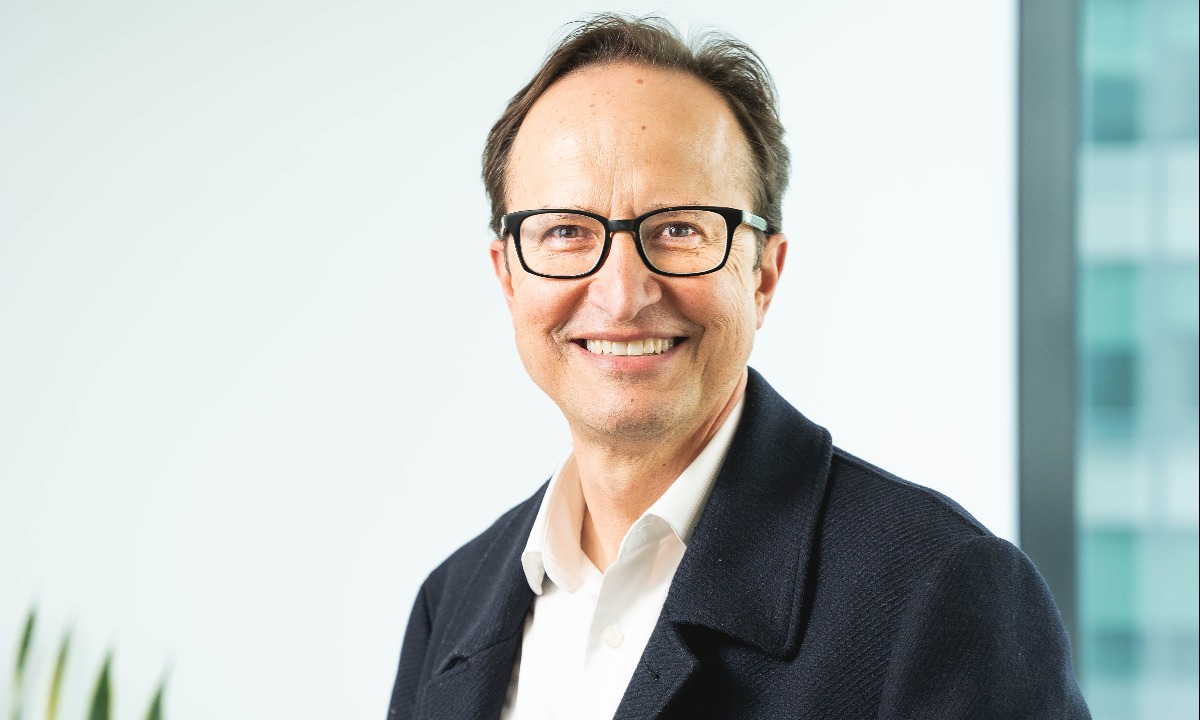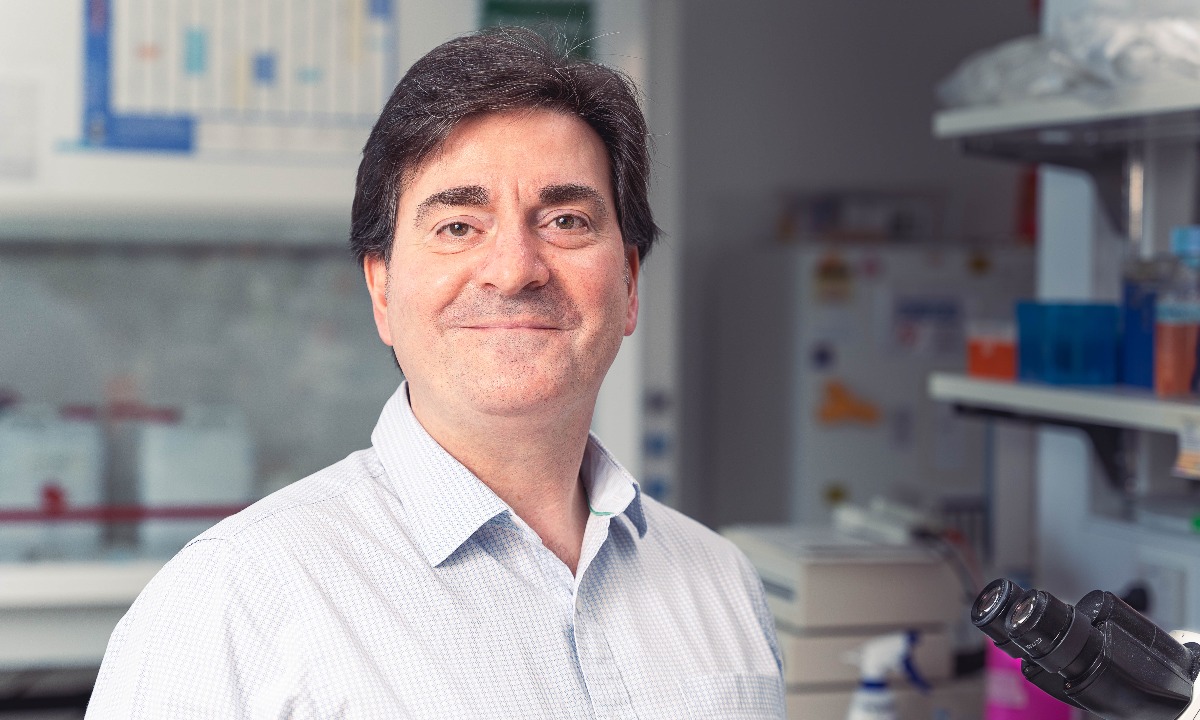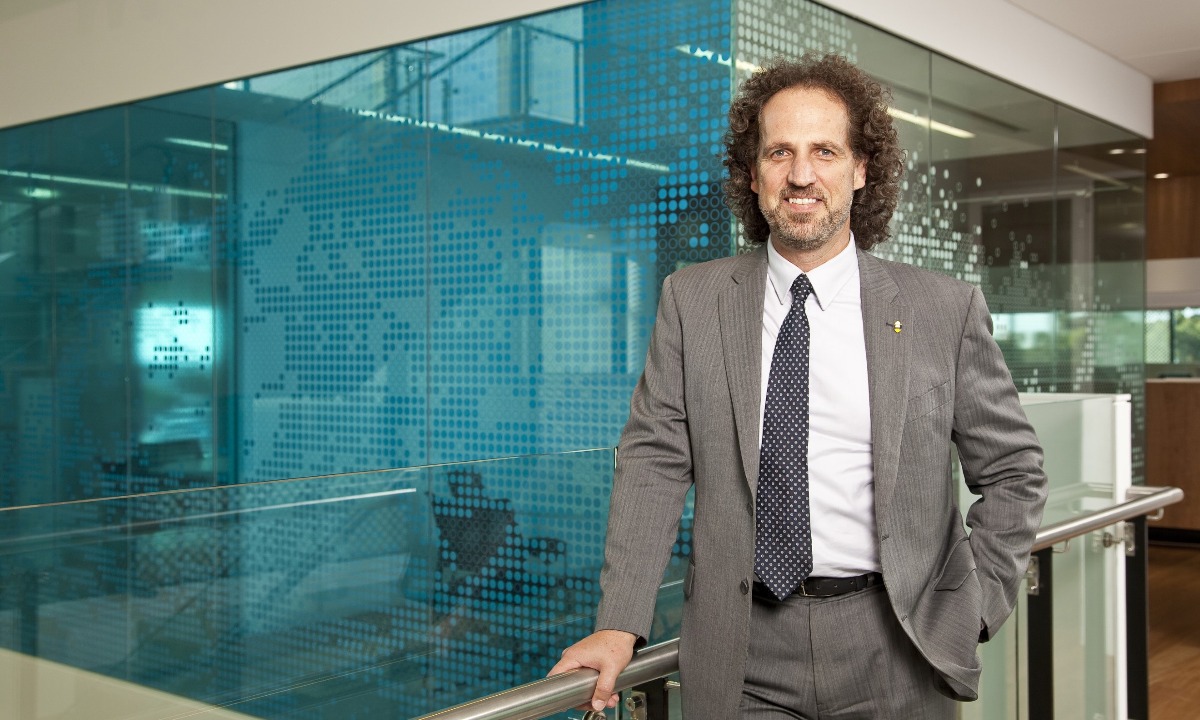Faces of Flinders: The researchers
To celebrate the 10-year anniversary of the Flinders Centre for Innovation in Cancer, we present some of the faces behind this life-changing initiative, including the centre’s researchers such as professors Chris Karapetis, Michael Michael and Ross McKinnon.

Flinders Centre for Innovation in Cancer.
Ahead of the game
With innovative clinical trials, cutting-edge research and world-class patient care operating under one roof, the Flinders Centre for Innovation in Cancer is undoubtedly “a step ahead”.
That’s the word from internationally-recognised precision medicine expert Professor Chris Karapetis, the Director of Clinical Research in Medical Oncology at the Flinders Centre for Innovation in Cancer (FCIC) and neighbouring Flinders Medical Centre (FMC).
Instrumental in anchoring FMC’s clinical trials unit to the FCIC when it opened in 2012, Professor Karapetis has seen hundreds of success stories come out of the Centre’s studies to test the efficacy of different cancer treatments.

Professor Chris Karapetis.
“Through our trials we get access to the most innovative treatments ahead of those treatments being recognised as standard,” Professor Karapetis says.
“That makes us a step ahead.”
For example, the Centre was one of the first in the world to successfully treat melanoma with immune therapy.
Before then, Professor Karapetis says chemotherapy was the standard treatment for advanced melanoma, with an “abysmal” success rate.
“It was a treatment that hardly ever worked and, even when it did, it worked only for a very short period of time. I remember seeing patients, very young patients, with metastatic melanoma who would die fairly quickly.
“Immune therapy treatments have now come a long way and we’re seeing patients survive for 10 years or more. These are patients with melanoma that spread to the liver, the bones and the brain so it’s remarkable to think they could get five or 10 years’ survival, maybe even a cure.
“It’s just great to have the option and opportunity for patients to be part of trials.”
World-famous research
The chief investigator in more than 160 clinical trials, Professor Karapetis is famously known for his groundbreaking work on predictive biomarkers in gastro-intestinal malignancy.
He says everyone has certain blood or tissue markers that, when tested against certain cancer drugs, can determine whether or not the treatment will be a success on an individual level.
The findings of his research have changed the management of colorectal cancer globally. The associated New England Journal of Medicine publication was nominated as one of the five key medical publications of 2008 by the prestigious medical journal, The Lancet.
“My clinical research is around trying to better understand which treatments work, when they work and who they work for so we can just do a blood test and tell a patient, ‘there’s no point giving you this treatment because it’s just not going to work’.
“We’re still doing research in this area, trying to find other markers and other ways of getting better outcomes for patients with cancer.
“We don’t want to give them treatments that we know are going to be ineffective and may be toxic if we can tell upfront, not to mention the expense of some of these medicines.”
Cause for collaboration
Professor Karapetis says FCIC researchers are involved in hundreds of projects spanning many sites and scientists – one of which involves treating rectal cancer without the burden of surgery and subsequent consequences, including living with a permanent stoma (a surgically made hole that allows waste to be removed from the body).
Other studies underway include combining chemotherapy and immune therapy to better treat oesophageal cancer, as well as trials in blood cancers such as chronic lymphocytic leukemia.
Before the FCIC was built on the space between FMC and nearby Flinders University, the researchers from both establishments were scattered across the Bedford Park precinct. The four-storey glass atrium put Flinders on the map, according to Professor Karapetis.
“By having the building, we created a certain degree of exposure that then made the site more popular, and certainly for people who want to work in this space, it made them more aware of us.
“It created a strong profile for Flinders as a place where good things are happening in cancer.”
Wellness over illness
Aside from world-class research, the FCIC embodies excellence in patient care; the infusion suite being one example of distinctive design meeting practicality.
The other is the ground-floor Wellness Centre including comfortable rest rooms for patients who have just undergone treatment upstairs, meeting rooms for consultations with allied health practitioners, and an information hub with computers, brochures and books.
“After their treatment is finished, patients might be living with the physical consequences of the intervention they went through. The psychological effects of having been diagnosed with cancer and going through that experience can also produce lasting consequences.
“So dietitians, physiotherapists and psychologists are all there to support patients and provide them with the extra care they need as they go through their treatments, and afterwards.
“The building is very much focused on wellness, not just acute illness.”
The future of flinders
As the FCIC celebrates a decade of history in 2022, the focus is on the future.
Talks are already underway to expand and reconfigure areas of the building, including more infusion chairs in the chemo day clinic.
“These are things we’re talking about now as we plan for the future.
“It’s a dynamic place and it will keep changing to meet the demands and to improve.”
World-leading research

Professor Michael Michael.
Besides the many remarkable research breakthroughs that have put the Flinders Centre for Innovation in Cancer (FCIC) on the world map, its greatest legacy is found in life’s smallest gestures.
“It’s a nice place to work but it’s also a nice place to see our patients, to be there for them,” says Professor Michael Michael, a research scientist who leads the cancer research program at the Flinders Health and Medical Research Institute.
“Every day I’m in the lift with patients and I get a chance to talk to them; you can see from the expression on their faces how they’re feeling. And that’s a huge motivator for us as researchers,” he says.
Michael, who chairs the Flinders Foundation Research Committee, has been involved in the FCIC from infancy, playing a role in the Foundation’s fundraising campaign that included securing a $1 million grant from the Australian Cancer Research Foundation.
“The real reason we needed the Centre was actually for the patients – it’s really important for cancer patients to be cared for in an integrated centre, it serves them really well.
“For us as researchers, we used to have several disparate groups all doing their own thing. We all talked, of course, but being able to bring people together and to merge our activity with the medical oncologists was fundamental and that’s what the Centre has done – it’s created many synergies that have allowed us to develop a new variety of research programs.
“If there’s a strength that we have within South Australia, it’s the fact that we integrate our research well with local clinical activities and that wouldn’t have been as easy without the FCIC.”
Molecules and eureka moments
Owned by the Flinders Foundation and co-located within the precinct shared by Flinders Medical Centre and Flinders University, the FCIC has been home to significant research discoveries since it opened a decade ago.
This includes a bowel cancer screening test that won a prestigious Eureka Prize in 2017, and a breakthrough on the link between red meat and cancer that was pivotal in the World Health Organisation’s 2015 classification of red meat as probably carcinogenic to humans.
Michael’s world-leading work on microRNA molecules, which started before the FCIC opened, was able to expand into new diagnostic tests and research to understand how different diets protect or predispose people to bowel cancer, once researchers were united under one roof.
Other big breakthroughs include Emeritus Professor Pam Sykes’ work with radiation and her prostate cancer collaboration with Dr Ganessan Kichenadasse, and a “watch and wait” clinical trial to determine rectal cancer recurrence that predicts whether surgery is actually needed post-treatment.
There’s also been a series of behavioural science-based studies, including work with the National Bowel Cancer Screening Program that has led to an increase in uptake, educating new migrants to be cancer aware, and various skin cancer campaign initiatives.
Professor Chris Karapetis has also advanced his high-impact precision medicine research that predicts the likelihood of successful treatment, providing patients don’t have a common bowel cancer mutation.
“There’s a ridiculously expensive family of drugs, such as Cetuximab, which are used to treat bowel cancer, but Chris showed that if you have a particular mutation you’ll put the patient through an unnecessary therapy and charge the health system for something that’s not going to work.
“That was one of the earliest examples of what’s called precision medicine, where you can tailor a therapy to peoples’ gene activity. That finding has probably saved the Australian health system well over $100 million in the last decade.”
Other studies currently underway include blood tests during treatment to gauge how patients metabolise the drug, thereby eliminating the one-size-fits-all approach to chemotherapy, and a growing body of research on brain cancer using the Flinders-run SA Neurological Tumour Bank.
There’s also the FCIC’s unique survivorship focus, which has translated research on cancer survivors’ unmet needs into tangible outcomes – this is also the inspiration for the new ground-floor Wellness Centre inside the four-storey glass atrium.
Last but not least, there’s the breadth of research currently undertaken – from Professor Janni Petersen’s Nature Metabolism-published research that uses yeast as a model to understand how cells work – to Associate Professor Luke Selth’s more clinically-oriented prostate cancer epigenetics.
“Our work here is really diverse, and that’s what’s great about what we do,” Michael says.
“We have medics doing their thing with the patients, we have the lab rats like myself, we have public health experts, data collectors and health economists bringing everything together.
“We can’t do it all in isolation, and that’s what the integrated strength of our Centre is all about.”
The future of cancer research
Whilst the Centre’s initial concept was to investigate solid tumours of the breast, prostate, gut, ovary, lung and liver, Michael says the scope these days is far broader and will continue to grow.
“We’ve always had strong research groups in blood cancers at Flinders, and we’ve recently recruited some fantastic researchers for multiple myeloma but there are also other diseases that we want to start tackling, including pancreatic cancers.
“We’ve got to go where the successes haven’t been so great and tackle the hard questions, the hard challenges. And I think we’re in a good position to do that.”
Face of Flinders’ cancer crusade

Professor Ross McKinnon
To capture the profound impact of cancer and the monumental importance of cancer research in a few short words is no simple feat. Yet the burden of the insidious disease is something world-leading cancer expert Professor Ross McKinnon expresses so eloquently.
“Cancer is a stake in the ground. It’s an emotive disease and it’s a disease that drives technical development; a galvanizing point for many things that are important in advancing medical research worldwide,” he says.
“A lot of the landmark breakthroughs in medical research are made in the cancer space so it’s a trailblazer for research and because of that, it’s critically important.
“It’s also a disease that has many flow-on effects in terms of quality of life for the individuals that have been affected, and the impact on families and relationships.
“The reality is that cancer affects every family and if it hasn’t – it’s only a matter of time.”
It’s these very reasons that sparked the Flinders Foundation’s decade-long campaign to build South Australia’s first integrated cancer centre – a flagship for world-class research, compassionate patient care and survivorship.
The Flinders Centre for Innovation in Cancer (FCIC) opened in April 2012 on the back of a hard-fought battle by the Foundation to raise $30 million in funding to create the space that occupies a shared footprint between Flinders Medical Centre and neighbouring Flinders University.
Professor McKinnon became involved in the Centre before the physical foundations were laid. Recruited in 2011, he was charged with the monumental challenge of leading a whole-of-Flinders approach to the hospital and university’s somewhat disparate research activities.
Once it opened, Professor McKinnon served as inaugural Director of the FCIC for five years, effectively becoming the public face of Flinders’ cancer crusade. Then, in 2019, he became Foundation Director of the university-owned Flinders Health and Medical Research Institute.
“The FCIC was built on a tripartite mission to combine high-quality clinical services, research and community engagement – it was very much a flagship facility for a whole raft of objectives in the cancer space that we set out to achieve.
“And the reason it worked so well is because the people who worked in the cancer area of Flinders, whether they were involved in the clinic delivery of services or in research, embraced the concept and wanted to make a real difference to our patients and our community.”
By the people, for the people
Aside from the holistic approach, it takes to cancer – from its dual role as a centre of research excellence and the second home of sorts for the people being treated there – a distinguishing feature of the FCIC lies in how it came to fruition.
“The building was built philanthropically, without any major external or internal funding. It wasn’t built by Flinders University and it wasn’t built by the health system. It was built by the Foundation and the Foundation raised that funding through a range of philanthropic sources, some government funds and a range of personal donations from people whose names are written on the wall of the building.
“When it opened there was almost a sense of wonderment from people like myself and those who worked there because it very much felt like a communal resource and a communal facility.
“It wasn’t like other university buildings. It wasn’t like other health buildings, it was something different, something special.”
Collaborating for a common cause
Having once worked in silos scattered throughout the University and hospital, the researchers who came to occupy the upper levels of the four-storey complex in 2012 embraced a new way of working – from the most eminent scientists to early career researchers.
And Professor McKinnon was no exception.
“One of the reasons I came to Flinders was in the hope that I could work with Chris Karapetis, the head of our oncology services and a world-famous researcher in the precision medicine space.
“In the first year I was at Flinders when I wasn’t located in the building, I think I saw Chris twice. When I moved into the building, I saw Chris every day.
“That culture of interaction was quite special. I felt an incredible sense of community and it felt different to any other time I’ve worked in a university, and I’ve done a lot of time in universities.”
The concept of collaboration is what Professor McKinnon says raised the profile of cancer not only at Flinders but also within Flinders.
“When you’ve got a mixed group of people that are operating across 10 different sites and then suddenly you give them a flagship focus, it becomes much more visible to the broader Flinders community.
“As a result of that, we got some excellent collaborative practices with the broader university environment and the involvement of people from outside cancer research, including the nursing college, for example.”
A stunning success
Research growth, a better patient experience and a greater sense of community connection – these are just some of the highlights from a very long list of accomplishments in the Centre’s short history.
For one, there’s the world’s oldest survivorship conference founded by the FCIC; there’s the remarkable breakthroughs in gastroenterology research, precision medicine and low-dose radiation; and there’s the grassroots implications for the people who walk through the glass doors every day.
“In terms of research metrics we’ve had quite spectacular growth; at one stage almost a quarter of the university’s research income was coming from a cancer-related project and we’ve sustained that.
“We’ve also built an environment where patients can see the people who look after them and see the people who are working on research projects to improve their care.
“When people walk into the building, they feel it’s their home in terms of their cancer journey.”
The past that shapes the future
Back where this story begins, with the surmise that cancer will catch us in one way, at some stage, is also where Professor McKinnon’s deeply personal battle began.
His relentless fight to find better treatments, to improve outcomes and to enhance the patient experience started after he lost his wife to breast cancer.
Now leading the front at the Flinders Health and Medical Research Institute, he reflects back on the incremental yet monumental advances in cancer over the years with humility.
“I’m incredibly proud of what we achieved in the early years of the Centre but it was always going to be an evolution.
“One of the things that drives us most is there are still these outstanding challenges; pick any type of cancer and there’ll be a major challenge associated with it.
“If we talk breast cancer, it’s how can women live their lives to the highest quality after the experience; in prostate cancer it’s how do we manage the disease because it’s so complex. And if we talk pancreatic cancer where the outcomes are appalling, it’s how do we get better survival rates?
“But I think we are strongly placed now to tackle these challenges as a result of the things that we put in place back then.
“I’m just as excited by the future as I was 10 years ago.”





